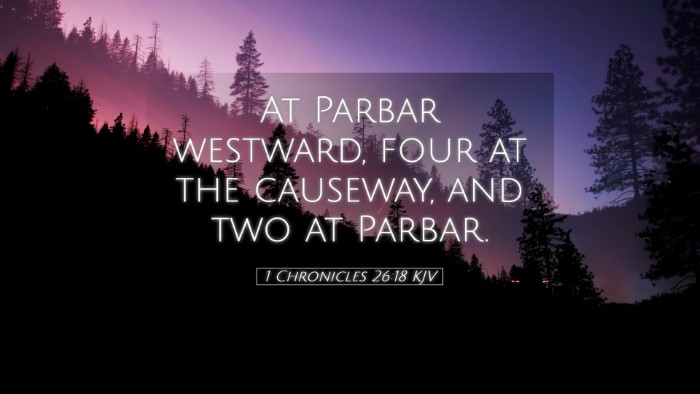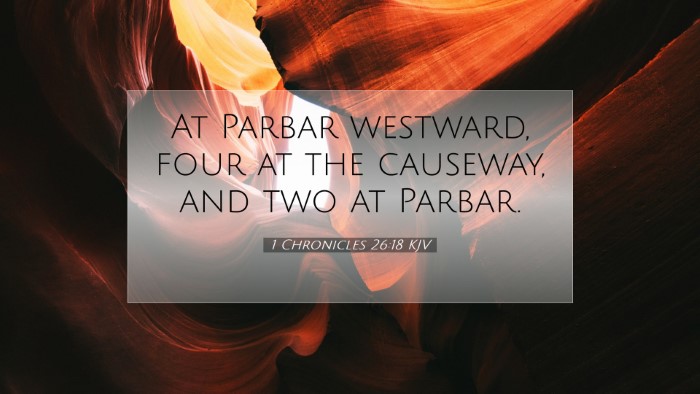Commentary on 1 Chronicles 26:18
Bible Verse: "At Parbar westward, four at the causeway, and two at Parbar." (1 Chronicles 26:18)
Introduction
The passage from 1 Chronicles 26:18 emphasizes the organization of the Levites in their duties concerning the temple and its precincts. This verse offers insights into the responsibilities laid upon the gatekeepers, who played a crucial role in the security and administrative functioning of the sanctuary. In this commentary, we will explore the significance of the gatekeepers' roles, the geographical implications of Parbar, and the theological underpinnings of their organization based on insights from public domain commentaries.
The Role of the Gatekeepers
- Matthew Henry's Perspective:
Matthew Henry emphasizes the importance of the gatekeepers as those who maintained order and sanctity within the temple. Their role was not merely functional but also symbolic, representing the vigilance required to safeguard the holy space. Henry remarks that these gatekeepers were entrusted with a sacred responsibility, reflecting the care with which the Lord expects His people to guard holy things.
- Albert Barnes' Insight:
Albert Barnes elaborates on the assignment of the gatekeepers, noting that they were divided into groups to manage the various entrances effectively. He underscores that this structured division was essential to ensure that the worshippers and offerings could proceed without disruption. Barnes also highlights the spiritual significance, suggesting that gatekeeping reflects the need for spiritual discernment and watchfulness in the church today.
- Adam Clarke's Commentary:
According to Adam Clarke, the mention of Parbar indicates a specific location associated with the temple activities. He expresses that the logistical arrangement of gatekeepers demonstrates the orderliness with which God wanted His house to be run. Clarke illustrates that just as these gatekeepers had to be vigilant at their posts, church leaders today must remain diligent in their stewardship over spiritual matters.
The Significance of Parbar
The term "Parbar" has sparked considerable interest among scholars. Various commentaries suggest differing interpretations of its meaning and relevance:
- Matthew Henry:
Henry suggests that Parbar might have been a suburb or outer place associated with the temple, highlighting its distinction as a place needing protection and oversight. This geographical detail underscores the broader expanse of the temple's influence.
- Albert Barnes:
Barnes notes that this location could imply a strategic point for monitoring who entered and exited the temple area. The attention to the geographical aspect of guarding shows a well-thought-out approach to security based on geography and visibility.
- Adam Clarke:
Clarke mentions Parbar as a reference point that illustrates the scope of the Levites' responsibilities. The precise identification of these locations indicates a structured ministry environment, reinforcing the need for diligence in spiritual oversight.
Theological Implications
The organization of the Levites and the specific mention of Parbar can lead us to profound theological reflections:
- Order in Worship:
The arrangement of the gatekeepers signifies the importance of order and reverence in worship. As emphasized by the commentators, every aspect of the temple service has a basis in divine order.
- Spiritual Discernment:
The responsibilities of the gatekeepers symbolize the need for spiritual discernment in the faith community. As they stood at the entrances, they acted as guardians of holiness, a role that church leaders continue to fulfill today.
- Security of the Faith Community:
Just as the gatekeepers protected the temple from potential threats, church authorities today bear the weight of protecting their congregations from spiritual dangers, emphasizing the role of vigilance in spiritual leadership.
Conclusion
1 Chronicles 26:18 offers a glimpse into the structured and ceremonial life of ancient Israel’s worship, underlining the responsibilities of Levite gatekeepers. By examining the insights from Matthew Henry, Albert Barnes, and Adam Clarke, we recognize the layers of meaning in the text, from practical management to theological implications. The careful organization of these gatekeepers serves as an enduring reminder of the necessity for order, vigilance, and respect for the sacred things of God in every generation.


